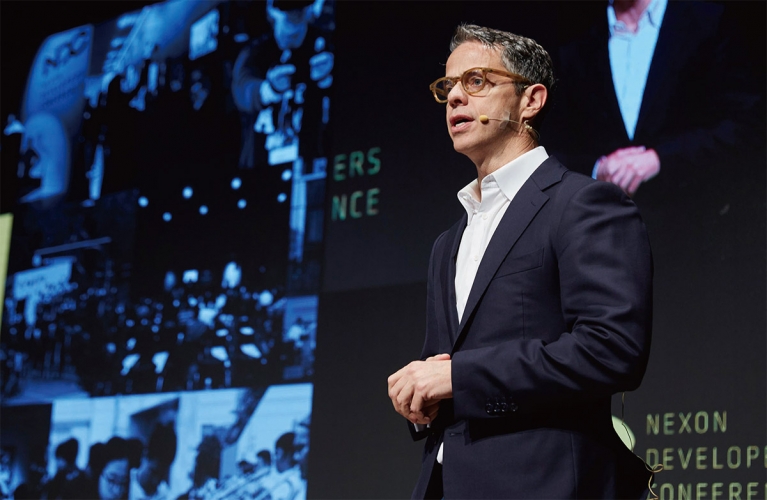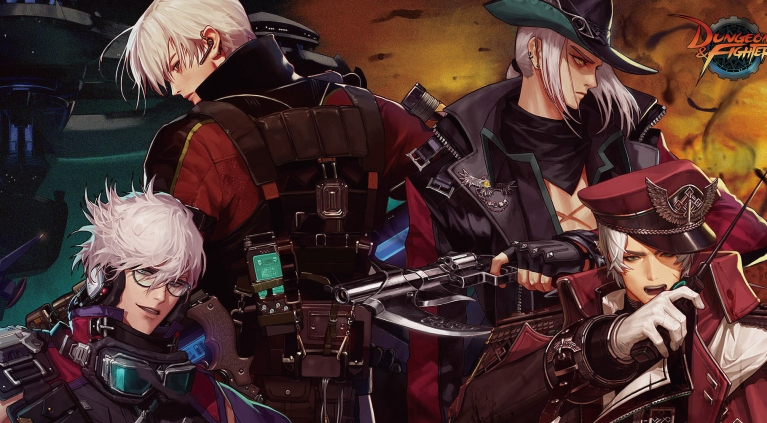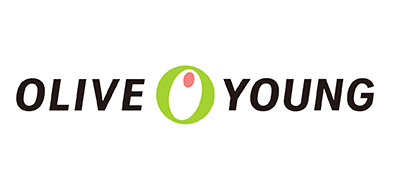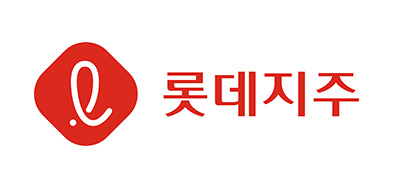COVID19 has changed the way people think and behave. As much of what used to be done off-line has shifted to the online world, companies are on guard to prepare themselves for the post-COVID era. In contrast, some industries have gained momentum with COVID19 – the games industry is one of them. Forbes Korea conducted an online interview with Owen Mahoney, CEO of Nexon, which recently announced a $1.5 billion investment initiative.
Nexon posted a strong 1st quarter this year with record quarterly revenues in Korea. Despite some revenue loss from China, Nexon’s key source of revenue, Korean sales increased by 78% year over year. Nexon’s biggest hit ‘Dungeon&Fighter’ took a hit from COVID-19 in China, but Nexon’s share price rose by more than 20% after the earnings release, becoming the first Korean gaming company to reach 20 trillion won in corporate value(market capitalization). This amount is 2.5 times larger than when Nexon was first listed on the Tokyo Stock Exchange in 2011 (8 trillion won), making Nexon large enough to walk shoulder to shoulder with Korean conglomerates like Kakao (market cap 23 trillion won) and Hyundai Motors (market cap 22 trillion). Nexon recorded an average 25% annual growth rate since 2002 to 2019.Owen Mahoney, president and CEO of Nexon, commented on Nexon breaking the $20 trillion market capitalization that “It’s a team effort, and all our teams including ‘MapleStory’, ‘FIFA Online 4’, ‘Dungeon&Fighter’, and ‘Sudden Attack’ have done fantastic work. The market capitalization is a reflection of their work”.Nexon, Korea’s largest game developer (market cap 24 trillion won as of June 19), is servicing over 60 games in 190+ countries worldwide. It launched ‘Kingdom of the Winds’, the first graphic PC MMORPG in 1996, and has grown into the gaming giant it is today based on the success of its steady sellers including ‘MapleStory’, ‘FIFA Online 4’, and ‘KartRider’. Nexon is now seeking a balanced growth in the worldwide transition from PC online to mobile with its recent launches of mobile projects such as ‘V4’, ‘KartRider Rush+’, and ‘EA SPORTS™ FIFA Mobile’.
Executive of the world’s largest gaming company takes a bet on Nexon’s futureSince Owen Mahoney became CEO of Nexon in 2014, the company’s market cap has grown from US$3B to US$20B in 2020. His leadership is defined by his careful management of creative teams, strategic M&A and insightful navigation of new markets and technology platforms. Under Mr. Mahoney’s management, Nexon creative teams provide live operations and new content to blockbuster game franchises that maintain growth in both players and revenue for several years, even decades. His M&A strategy has expanded the company’s creative output with the acquisition of talented teams at Big Huge Games, Pixelberry Studios, NAT Games, and most recently Embark Studios and a strategic investment in Wonder Holdings. Today, as the entertainment industry navigates a secular shift from linear to interactive formats, Mr. Mahoney leads Nexon’s expansion of its powerful IP onto new technology platforms including cross-platform capability on PC, mobile and console systems.Nexon’s market cap exceeding 20 trillion won suggests that investors have greater expectations about Nexon’s future then its present. “The global entertainment industry is going through a secular shift and changing faster than we realize”, said Owen Mahoney. “The West may not see this yet, but looking at the global market, games are already the leader of the entertainment industry”, he added.Owen Mahoney first met Jay Kim (CEO of NXC) and the founding team at Nexon in the mid-nineties when he was working at an early internet media company called PointCast. Jay Kim had just started the company and the team had been working on ‘Kingdom of the Winds’, the first graphic MMORPG. Fascinated by the vision for the future of games as well as the creative thinking of Jay Kim, Owen Mahoney kept in touch with him as he led EA’s corporate development group for 10 years. EA at the time was determined to build an online business in Asia, which helped him continue his relationship with Nexon. He also tried to build a strategic relationship between the two companies on several occasions.EA recognized Nexon as a pioneer in what would become a massive game genre from the onset. “Nexon pioneerd the first online RPG with ‘Kingdom of the Winds’, and the first free-to-play game with ‘Quiz Quiz’,” said Owen Mahoney. “‘MapleStory’, which came out in 2003, and ‘KartRider’, in 2004, did not look very much like games in the West, but they broke new creative ground by leveraging the internet in ways that were revolutionary at the time. It became clear to me that this was the future of games, so I tried really hard to make something happen between the two companies,” he added. Later on, he joined Nexon as CFO upon Jay Kim’s suggestion in 2010 and successfully led Nexon’s IPO in 2011.Owen Mahoney, who made pocket money by selling early models of Apple computers as a teenager in San Francisco, majored in Asian Studies at UC Berkeley. Later, he went on to hold executive positions at American and Asia software companies including FileMaker, PointCast, Claris Japan and Radius. One of his best friends in high school was from a Korean immigrant family, which helped him learn more about Asian countries. It was also a time when Japanese motor companies such as Toyota and Nissan were taking over the American market, which naturally made his interest in the Asian market grow.
Leading the “Korean Wave of Games”Owen Mahoney is on a mission to expand Nexon’s deeply immersive, virtual game worlds to Western markets including the U.S. and Europe. “You have to be able to say ‘No’ to all the little things to be able to say ‘Yes’ to our area of focus” he said. “Nexon’s focus is fully online multiplayer games, multiple platforms, Nexon IP, and selective investments in new IP and technology.”NXC CEO Jay Kim founded Nexon when he was developing the world’s first online game ‘Kingdom of the Winds’ in 1994. Nexon first introduced the ‘free-to-play’ business model in the games industry and successfully built a strong portfolio of steady sellers including ‘MapleStory’, ‘Dungeon&Fighter’, ‘FIFA Online’, and ‘Sudden Attack’.‘MapleStory’, one of Nexon’s oldest steady sellers, is a 17 year old title which is still generating record-breaking quarterly revenue in Korea, with its 1Q quarterly revenue in Korea growing 132% year-over-year. ‘MapleStory M’, a mobile version of ‘MapleStory’, also grew 184% in the same period, well proving its potential.“‘MapleStory’ has shown great results for several quarters now. It reflects our focus on deeply immersive virtual worlds,” said Owen Mahoney.‘MapleStory’ is an online game developed by Wizet Studio in 2003. Nexon acquired Wizet Studio in 2004 at a price of 40 billion won, and since then, ‘MapleStory’ has grown into one of Nexon’s biggest revenue sources along with ‘Dungeon&Fighter’, with over 1.3 billion users from 9 different countries.‘Dungeon&Fighter’, an online action RPG developed by Nexon’s subsidiary Neople, launched in Korea in 2005 and in China in 2008. It has been leading China’s PC online game market for over a decade ever since. The Dungeon&Fighter franchise, leading the ‘K-game’ fever in China along with Krafton’s ‘PUBG’, reached more than 700 million registered players globally and set a record of 5 million maximum concurrent users in China.Anticipation for ‘Dungeon&Fighter Mobile’, which is set to launch soon, lies behind the rise in Nexon’s share prices after its Q1 earnings release. ‘Dungeon&Fighter Mobile’ has already received over 40 million pre-registrations from players in China. “With mobile devices and mobile versions of games that were only available on PC, the total addressable market has become much bigger,” said Mahoney.China’s tech giant Tencent is servicing ‘Dungeon&Fighter’ in China since 2016 with a 10-year contract, paying a large sum in royalties to Nexon. ‘Dungeon&Fighter’’s lifetime gross revenue exceeded $10 billion in 2017 and has recorded over $13 billion until last year. This surpasses the lifetime gross revenue of the famous fighting franchise ‘Street Fighter’, and is the highest record (#7 global game franchise revenue) set by a Korean company in the worldwide gaming market.With the success of ‘Dungeon&Fighter’, Neople posted a strong year in 2019 with revenues of 1.1396 trillion won and an operating profit of 1.0367 trillion won. Neople is the first Korean game developer to record an operating profit of over 1 trillion won. The cream of the crop, Neople provides over 1 trillion in cash for Nexon annually since 2017 – which is why Nexon is putting everything into ‘Dungeon&Fighter Mobile’’s success.Nexon also recently announced that Neople’s ‘Dungeon&Fighter Mobile’ development team will be moving from Jeju to Seoul. Neople will be providing extensive support to the employees who will be relocating, including a 400 million won loan for employee housing, an interest-free loan program, 5 million won relocation support fee, full support of moving expenses, and 100% accommodation of relocated employees’ children in company-run day care centers.The market’s focus is on where Nexon will invest in next. “We intent to invest $1.5 billion in publicly traded companies that demonstrate the ability to create and sustain strong global entertainment properties,” Nexon said in a public announcement on June 2. Nexon holds approximately 1.8 trillion won of investment capital which includes a 1.5 trillion won loan it took from Neople.“We intend to make smart investments – a good use of Nexon’s cash in a market defined by low interest rates,” said Mahoney. “We’re looking for companies that share Nexon’s vision for creating and sustaining strong intellectual properties across multiple markets, in multiple formats for long periods of time,” he added. “The global entertainment industry is going through a secular shift from linear to interactive entertainment – immersive virtual worlds. The companies that adjust to this shift well will benefit from it for the next 10 years. We want to take part in their success using some of Nexon’s cash.”Industry officials are already naming prospective candidates, mostly world-class companies with strong content including Disney, Nintendo, and Netflix. Jay Kim, CEO of NXC and founder of Nexon, has said on several occasions that he wanted to make Nexon grow into the Disney of Korea. Disney, with its strong IP portfolio that consists of globally famous franchises like Mickey Mouse, Avengers, Iron Man, and Star Wars, could create much synergy when partnered with games. However, Disney’s market capitalization is approximately 260 trillion won, which would mean that Nexon’s $1.5 billion investment capital would get Nexon less than 1%. Thus industry officials are also looking into the possibility of Nexon making small investments without participation in management.Owen Mahoney is focusing more on the future growth potential of the games industry than its present. “Global media companies like Disney, Apple, Google, and Amazon are trying to figure out the games business. They are also seeing the shift to online and interactive entertainment which has been made more obvious by COVID,” he said. “The games industry is substantially bigger than linear entertainment such as films, music, sports, etc. It is also growing 3 times faster. In 20 years, we will be able to see that this was a turning point in the entertainment industry. With our focus, Nexon is going to build a virtual game park comparable to Disneyland,” he added.
[box content] ‘K games’ target the global market with ‘killer content’Korean game companies have pioneered overseas markets ever since the first expansion of PC games, heightening the status of Korean games. ‘Dungeon&Fighter’(Nexon), ‘The Legend of Mir’(Wemade), ‘Crossfire’(Smilegate) have gained a strong foothold in China as well as South America and South East Asia. ‘Player Unknown’s Battlegrounds’(PUBG) which came out in 2017 also became a global hit including in the West, setting a record of the highest concurrent users on STEAM (3 million).The Korean game market, which is growing steadily, takes up 4th place in the world, next to the U.S., China, and Japan. Despite negative perceptions about games and various regulatory setbacks such as the shutdown system, the Korean game market grew 8.7% year-over-year in 2018, approximately 14.29 trillion won in size.The mobile game market in particular is leading the growth, having surpassed the PC game market in terms of revenue for the first time in 2017. In 2018, the revenue from Korea’s mobile game business was 6.65 trillion won(46.6%), PC game business 5.23 trillion won(35.1%), PC café business 1.82 trillion won(12.8%), and console business 528 billion won(3.7%).The Korean government is also taking steps to improve the situation regarding gaming regulations, having selected games as a core industry. The Ministry of Culture, Sports, and Tourism recently announced its ‘Comprehensive Plan to Promote the Games Industry’, and set up goals such as reaching 19.9 trillion won in revenues, 11.5 trillion won in exports, and 102,000 jobs by 2024. The government is also planning to build e-Sports stadiums in Busan, Daegu, and Gwangju in November to support e-Sports expansion.With the possibility of e-Sports being adopted as an official category in the 2022 Asian games as well as for the Olympics, there are plans under way to have games recognized as an official sport. The Olympic Council of Asia(OCA) adopted e-Sports as a demonstration sport in the 2018 Jakarta-Palembang Asian games, in which ‘Faker’ Sang Hyuk Lee competed as part of Korea’s national team and won the silver medal.In 2019, the Korean games industry recorded revenues of 15 trillion won, exports of 7.6 trillion won, and hired 870,000 people. More than half the revenue came from the ‘big 3’, which are Nexon, NC Soft, and Netmarble. The game industry’s exports were the highest among the 11 content industries(film, music, comics, etc.) that the Ministry of Culture, Sports, and Tourism selected.The global games industry continues to evolve – it is becoming a knowledge-intensive service business with high added value. The value of the games industry is defined by the value of intellectual property. With more and more opportunities to converge with IT and new media such as YouTube and Tic Toc, gaming companies worldwide are seeking investment/research opportunities to collaborate with and expand into other industries including music, films, broadcasting, and animations.




















